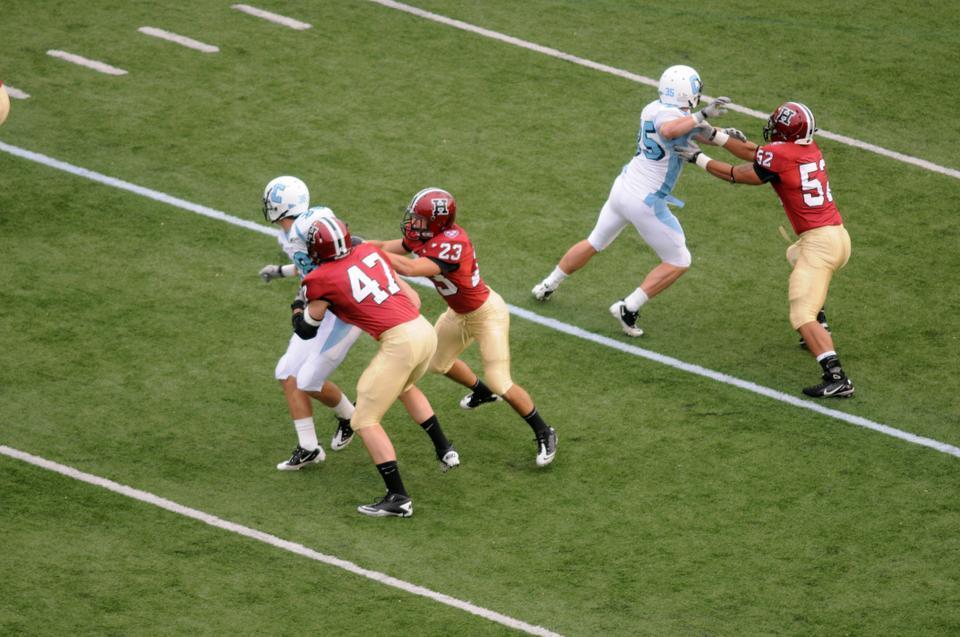
News
Summers Will Not Finish Semester of Teaching as Harvard Investigates Epstein Ties

News
Harvard College Students Report Favoring Divestment from Israel in HUA Survey

News
‘He Should Resign’: Harvard Undergrads Take Hard Line Against Summers Over Epstein Scandal

News
Harvard To Launch New Investigation Into Epstein’s Ties to Summers, Other University Affiliates

News
Harvard Students To Vote on Divestment From Israel in Inaugural HUA Election Survey
Results Unpredictable in FCS Football

No one may have said it, but everyone was thinking it. Last Friday’s game against Brown was a must-win for Harvard football.
With only seven league games all year, one loss against a team in the middle of the pack can be crushing. When the Crimson dropped its game against Brown last year, putting itself in an early 0-1 hole in league play, Harvard had to play with an if-we-lose-one-more-time-we’re-done mentality. And when the Crimson did lose one more time—to eventual league champion Penn—the team was done.
Because falling to any league team not named Yale or Penn eliminates any and all margin for error. After that, any mistake, and it’s “Wait ‘til next year.”
But there’s a problem: football sometimes makes as little sense as the BCS system or voluntarily living in New Haven.
And that’s especially the case in the FCS, where sometimes randomness and chaos reign.
Here’s an example from the past few weeks. Some quick facts:
1) The Quakers were named the favorites to repeat as champions of the Ivy League this year, so they’re clearly favored to beat Yale when the teams square off near the end of October.
2) Two Saturdays ago, when the Bulldogs and Georgetown met up, the Yalies took the contest, 37-27.
3) The week before, the Hoyas had hosted Lafayette, and Georgetown managed to hold on for a tight, 14-13 win.
4) In its first game of the year, Penn hosted Lafayette at Franklin Field.
It almost sounds like an SAT question. If Penn is favored over Yale, Yale beat Georgetown, and Georgetown beat Lafayette, then Penn should’ve beaten Lafayette, right?
Wrong.
Lafayette didn’t narrowly win, either. The Leopards obliterated Penn, 37-12. That’s less like a football game and more like a public execution.
But that’s sports. Just because A beats B and B beats C, by no means can we preemptively crown A the winner over C.
In football, one source of randomness is clear: injuries. Players get hurt all the time on the gridiron, and that can drastically change a team’s dynamic. In fact, in just the first game of the year, Harvard temporarily lost one of its best defenders in junior linebacker Blaise Deal and the leader of its offense in senior quarterback Collier Winters. There’s no way to guess that would‘ve happened, though both have been fairly injury-prone over the past few seasons.
Another football truth gives rise to randomness too: teams are often sloppy, especially in the first games of the year. The Crimson knows this all too well. In Week One, when Harvard traveled to Worcester to face off against Holy Cross, the team committed a series of costly turnovers which ended up costing it the game.
At no point did the Crimson seem like the weaker team on the field. More unpolished? Sure. But I think all around a better football team. Harvard had 48 more yards of total offense and one less first down. Take out the pick-six and the blown coverage, and the Crimson now probably sits at 2-0.
The turnover bug also bit Penn in that fateful game against Lafayette. You never would’ve expected it from a team that prior to the game held the nation’s longest winning streak, but, well, that’s football for you. The Quakers turned the ball over three times, and the Leopards blocked a Penn punt. Yet somehow, Penn managed 20 more yards of total offense.
You can’t eliminate randomness. The better team won’t always win. That’s impossible, as any statistician will gladly tell you.
But what can teams and coaching staffs do? Prepare for the worst. Have solid guys ready to step up in case the starter goes down. Harvard nailed that one. Junior quarterback Colton Chapple couldn’t have been a whole lot better for a lot of Friday night’s game. And Deal’s replacement—junior linebacker Joshua Boyd—led the team in tackles and was a force in the middle of the defense.
Of course, teams also have to learn from what they did wrong. After a sloppy performance against Holy Cross, the Crimson did just that. Harvard did a 180, with the only blip of the night coming from a rain-induced interception. No more dropped punts, no more secondary breakdowns.
So in the course of playing virtual must-win after must-win (though Harvard has a week off before returning to league play), a championship-caliber team must not only improve every week, but also to expect the unexpected—to expect randomness.
And Harvard, clearly, understands that quite well.
—Staff writer Robert S. Samuels can be reached at robertsamuels@college.harvard.edu.
Want to keep up with breaking news? Subscribe to our email newsletter.
